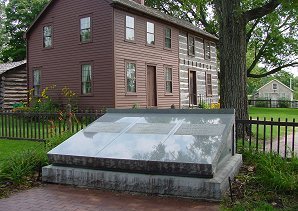×

|
CHAPTER XI. NOTHING is
here known of the writer of the following statement beyond what
the article
itself contains. It is interesting in connection with Daniels'
narrative on
account of the source from which it emanates, and it will be seen that
these
two eye-witnesses to the murder corroborate each other in all except a
few
unimportant particulars. The general thread of their statements
harmonize. He
says nothing about the flash of light, which Daniels testifies of, nor
does he
mention his attempt to cut the Prophet's head off after he had been
shot, but
as an admission of the latter fact would only criminate himself,
it is not to
be wondered at that he suppressed that part of the narrative.
Mr.
Editor:
Sir-As your paper has quite a circulation in
this congressional district, I hope
you
will find room in your paper for these
lines. My reason for writing is to let the citizens of
this and the adjoining Counties
know who they are voting for when they are voting for Thos. Sharp, of Warsaw. I
have been attending court here for several days past, and find
that there are
some who calculate to cast their votes for Sharp. I will now give my
reasons
for being against Sharp:
I came from Iowa to Warsaw, Illinois, three weeks before the murder of Joseph and Hyrum Smith. I was quite a young man, not over twenty years old, and had not much experience in life. Sharp, and some others, persuaded me to call my name Boggs, a son of Governor Boggs, of Missouri. I agreed to do so, and then Sharp circulated all kinds of mean tales about the Mormons. He often said, in my presence, that there was a "young man that Jo Smith had his father shot," which had a great influence to raise the prejudices of the people against the Mormons. He also persuaded me to join the company that was gathering there to meet the governor's troops at Carthage, which I did. The time came when we had to march to Carthage. We marched about six or eight miles and met a man with orders from the governor, that we were not wanted and to return to our homes. This word enraged Capt. Sharp, as he was called, very much. He said all might go home that wanted to; but he would go to Carthage, if he had to go alone. He said Smith ought to be killed, and if he could raise men, it should be done before night; he was in jail, and now was the time. He then asked how many of those in the company would go with him to Carthage to commit this disgraceful deed. Clerk Burs, Snar Redman and Hoakes Middleton were the first to join Sharp. He then asked if the rest were all cowards. At that, about fifty or sixty went over to him, and myself with the crowd. Jack Davis said he was no coward, but he should not go in such a company, in a thing of that kind. He and several others went back. We then organized and moved for Carthage. We moved to a point of timber, west of Carthage, and waited for Williams to return, as he had gone on to see if there were any there who would oppose us. When we came to the timber, a man came to us on a large, white horse; he brought with him a note to Sharp, stating that he would not meet with any opposition. This paper was signed Hoake and some other person shot him; whether it was Sharp, or not, I never could exactly learn; but I presume it was, as his gun was empty. We then left the jail. When we got a few rods from the jail, Sharp ordered all the guns loaded that were empty and he "loaded his. I was led into this mean act by Sharp and others, at Warsaw. I can only say, I wish they had given me good advice in place of that they gave, as it has caused me to be an unhappy man ever since. While we were in the timber, the man on the white horse brought a letter to Sharp, how to manage when he came to the jail, and spare none of them, as they were all four Mormons. This letter was signed A. Simpson. I could give the names of several more, but I will not do it at present. N. B.-I hope you will not fail to publish these lines. I would send you the money to pay for the job; but I am a good ways from home and my means limited. I live in the south part of Missouri. W. WEB. Testimonies:- We certify that this is a true copy of the original.
ALEX McEWEN, |